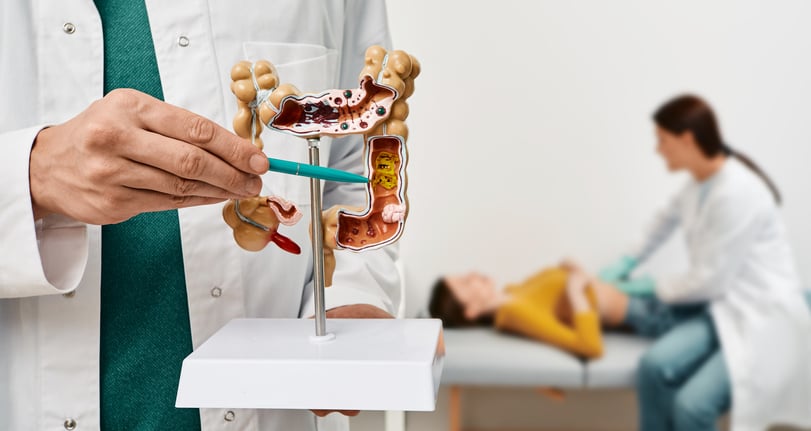
Types of Polyps
Adenomatous
Adenomas or adenomatous polyps are neoplastic in nature. These are precancerous polyps that have a high likelihood of becoming cancerous if left untreated. Patients diagnosed with adenomatous polyps are recommended to have more frequent cancer screenings. The frequency varies depending on the patient’s personal risk factors.
Types of adenomas:
- Tubular
- Villous
- Tubulovillous
- Sessile serrated
- Traditional serrated
Hyperplastic
Hyperplastic polyps are very common and are encountered more often in the distal colon. Typically, hyperplastic polyps are slow-growing and not pre-cancerous. Hyperplastic polyps, by definition, are not neoplastic, and are typically followed on a different surveillance protocol than adenomatous polyps.
Inflammatory
Inflammatory polyps are caused by prolonged inflammation of the colon. Conditions that precipitate inflammatory polyps include inflammatory bowel disease, ulcerative colitis, constipation and infection. This type of polyp develops anywhere along the colon but are most common in the sigmoid colon and rectum. These polyps are typically benign and unlikely to become cancerous.
ICD-10-CM Coding – Current Disease
ICD-10-CM classifies polyps of the colon or rectum by whether the type of polyp is adenomatous, hyperplastic, inflammatory or unspecified and/or by site or complication.
- Adenomatous polyps are reported from category D12 Benign neoplasm of colon, rectum, anus and anal canal and then further classified based on site.
- Hyperplastic polyps are reported by site; K62.1 Rectal polyp or K63.5 Polyp of colon. The codes for hyperplastic polyps are the default when the type of polyp is not specified.
- Inflammatory polyps of the colon are reported with codes from subcategory K51.4 Inflammatory polyps of colon and further specified as without complication or by type of complication such as rectal bleeding or abscess.
- A hyperplastic polyp with focal areas of adenomatous change is reported in the same way as an adenomatous polyp, with a code from category D12 Benign neoplasm of colon, rectum, anus and anal canal. This is based on the need for stricter surveillance and follow-up due to the presence of adenomatous tissue.
| Type of Polyp | ICD-10-CM Category/Code |
|
Adenomatous |
D12 Benign neoplasm of colon, rectum, anus and anal canal |
|
Hyperplastic |
K62.1 Rectal polyp, K63.5 Polyp of colon |
|
Unspecified |
K62.1 Rectal polyp, K63.5 Polyp of colon |
|
Inflammatory |
K51.4 Inflammatory polyps of colon |
|
Mixed |
D12 Benign neoplasm of colon, rectum, anus and anal canal |
ICD-10-CM Coding - History of Polyps
ICD-10-CM has codes to report both personal and family history of colorectal polyps.
Personal History
- A personal history of colon polyps is reported with a code from subcategory Z86.01 Personal history of benign neoplasm with a 6th character of “0” for personal history of colon polyps and a 7th character identifying the type of polyp as adenomatous, serrated, hyperplastic, other (includes inflammatory) or unspecified. Based on the includes note under code Z86.010, a personal history of colorectal or rectal polyps is also included for reporting in this subcategory.
| Type of History | ICD-10-CM Subcategory/Code |
|
Personal |
Z86.0100 Personal history of colon polyps, unspecified Z86.0101 Personal history of adenomatous and serrated colon polyps Z78.0102 Personal history of hyperplastic colon polyps Z86.0109 Personal history of other colon polyps |
Family History
- A family history of adenomatous and serrated colon polyps is reported with code Z83.710 Family history of adenomatous and serrated polyps.
- A family history of hyperplastic colon polyp is reported with code Z83.711 Family history of hyperplastic colon polyps.
- A family history of colon polyps other than adenomatous, serrated, or hyperplastic (e.g., inflammatory) is reported with code Z83.718 Other family history of colon polyps.
- A family history of polyps of the colon that are not specified as either adenomatous, serrated, hyperplastic or of other type are reported with code Z83.719 Family history of colon polyps, unspecified.
- A family history of familial adenomatous polyposis is reported with code Z73.72.
| Type of History | ICD-10-CM Subcategory/Code |
|
Family |
Z83.710 Family history of adenomatous and serrated polyps. This code included conditions classifiable to D12.-. Z83.711 Family history of hyperplastic colon polyps Z83.718 Other family history of colon polyps Z83.719 Family history of colon polyps, unspecified Z83.72 Family history of familial adenomatous polyposis |
Coding With or Without the Path Report
There is no requirement that coding cannot be done until all diagnostic results are available. Every organization will need to develop their own policy regarding whether coding of procedures that include sending specimens for pathological analysis will be held until pathology reports are available for review and coders should check with the facility to determine what reports should be available prior to code assignment. Coders should code, to the highest degree of certainty, what is known at the time of code assignment whether that is before or after diagnostic results can be reviewed.
Examples
- A patient with personal history of tubulovillous adenoma of the colon presents for screening colonoscopy during which a hyperplastic polyp of the rectum is found and removed by snare technique.
- ICD-10-CM Diagnosis Codes:
- K62.1 Rectal polyp
- Z86.0101 Personal history of adenomatous and serrated colon polyps
- A patient with family history of colon polyps presents for screening colonoscopy during which a tubular adenoma of the descending colon and a polyp of the sigmoid colon are found and removed.
- ICD-10-CM Diagnosis Codes:
- D12.4 Benign neoplasm of descending colon
- K63.5 Polyp of colon
- Z83.719 Family history of colon polyps, unspecified
- A patient presents for screening colonoscopy during which a polyp of the sigmoid colon was found and removed via hot snare. The pathological findings revealed hyperplastic polyp with focal adenomatous changes.
- ICD-10-CM Diagnosis Codes:
- D12.5 Benign neoplasm of sigmoid colon
Take Aways
- Adenomatous polyps are reported as benign neoplasms
- Unspecified polyps are reported as hyperplastic
- Mixed polyps are reported as benign neoplasms
- Personal history of colon polyps is coded as a personal history of benign neoplasm.
- Assignment of codes for family history of colorectal polyps is determined by type of polyp (e.g., adenomatous vs. hyperplastic vs. other)
- Coding is always based on the highest degree of certainty at the time of coding whether or not the path report is available for review.
References:
- ICD-10-CM Alphabetic Index and Tabular List
- AHA Coding Clinic for ICD-10-CM and ICD-10-PCS, First Quarter 2018: Page 6
- AHA Coding Clinic® for ICD-10-CM and ICD-10-PCS, Second Quarter 2015, Pages: 14-15
- wikipedia.org/wiki/Colorectal_polyp#Neoplastic_polyp
- Colon Polyps: Symptoms, Causes, Types & Removal (clevelandclinic.org)
In need of coding support? We offer both inpatient coding support and outpatient coding support services. Partner with us to replace underperforming coding vendors, get coding backlogs caught up, staff for a FMLA/vacation gap, special projects, to assist in Single Path Coding, or for Total Outsource Coding Support.
The information contained in this coding advice is valid at the time of posting. Viewers are encouraged to research subsequent official guidance in the areas associated with the topic as they can change rapidly.
Subscribe to our Newsletter
Recent Blogs
Related blogs from Industry News , Medical Coding Tips
CMS Hospital Compare is a public reporting pl...
Premier benchmarking is widely used by hospit...
PEPPER reports help U.S. hospitals identify o...
CMS has released the updates to the ICD-10-PC...
Subscribe
to our Newsletter
Weekly medical coding tips and coding education delivered directly to your inbox.


.png)


